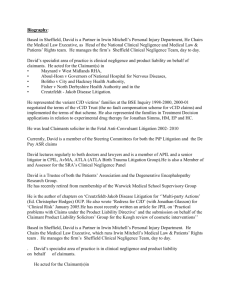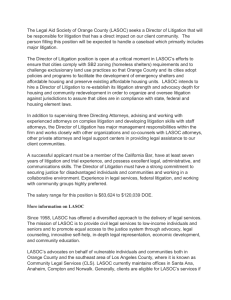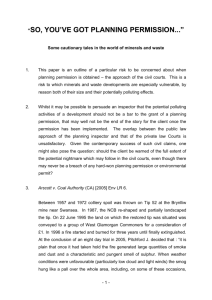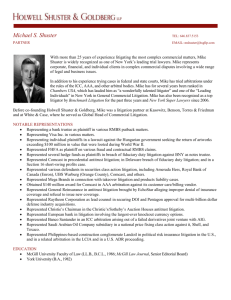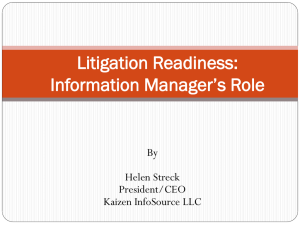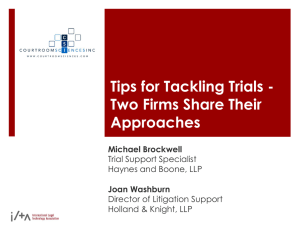Gordon Wignall`s presentation (MS PowerPoint)
advertisement
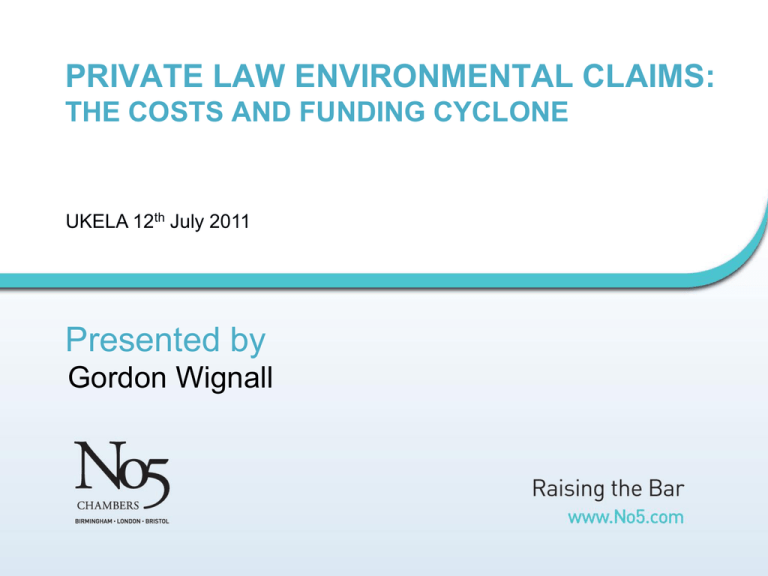
PRIVATE LAW ENVIRONMENTAL CLAIMS: THE COSTS AND FUNDING CYCLONE UKELA 12th July 2011 Presented by Gordon Wignall PRIVATE NUISANCE PROCEEDINGS A VICTORY FOR THE PRIVATE INDIVIDUAL Pride of Derby and Derbyshire Angling Association LD. and Another v. British Celanese LD. & Ors [1953] Ch. 149 An injunction granted restraining the (3) Defendants from discharging effluent into the River Derwent so as to alter the quality (including the temperature) of the water of the river to the injury of the plaintiffs or so as to interfere with the plaintiffs' rights of fishery Halsey v. Esso Petroleum Co. Ltd. [1961] 1 W.L.R. 683 Damages and an injunction to restrain the emission of noise and smells from an oil refinery; damages in respect of the emission of oily smuts 2 THE TORT Threshold – the robust standards of ordinary English folk Causation – is the installation the source? State of affairs – an element of permanence rather than intermittence Nature and character of the area? Best practicable means – not a defence Planning permission very unlikely to be an automatic defence Defence! - statutory authority – Marcic (Can be defeated by negligence) Liability may extend to acts of independent contractors Injunction the usual remedy CAUTION! Measured Duty of Care (Anthony v. Coal Authority) Reasonable user & Barr v. Biffa Waste (18th April 2011) 3 GROUP LITIGATION CPR PART 19 1. 2. 3. 4. 5. 6. Common Issues of fact or law A register of claimants Decisions on common issues are binding on the claimants Cost sharing (costs apportioned per quarter) Novel case management Cut-off date to benefit the Defendant CAUTION! Practice Direction – Group Litigation 6.1A “A claim must be issued before it can be entered on a Group Litigation” 4 GROUP LITIGATION CPR PART 19 Lord Woolf Access to Justice Final Report (1996) 1. Common issues are not identical issues. Treat different cases different ways: maximum flexibility; individual proceedings in parallel 2. “The earlier the court exercises control in a multi-party action the better chance of managing the case to a satisfactory resolution” 3. Ten or more claimants: five may be sufficient 4. “No need for the Court to take a view of the merits [at the certification stage]” 5. “Imagination and creativity” 5 GROUP LITIGATION IN PRACTICE 1. Are the emissions about which the Claimants claim caused by the operation and management of the plant? 2. What is the distance beyond which complaints of nuisance are not justified? 6 GROUP LITIGATION CPR PART 19 Lord Woolf Access to Justice Final Report (1996) 1. Common issues are not identical issues. Treat different cases different ways: maximum flexibility; individual proceedings in parallel 2. “The earlier the court exercises control in a multi-party action the better chance of managing the case to a satisfactory resolution” 3. Ten or more claimants: five may be sufficient 4. “No need for the Court to take a view of the merits [at the certification stage]” 5. “Imagination and creativity” 7 EXAMPLES Landfill sites Composting sites Motor Racing Foundries Low Frequency Noise Mining and quarrying 8 FUNDING VEHICLES I – CFAs No claimant gets a complete indemnity for fees Waive unrecovered costs Premiums staged 100% at trial Covers pre-action work, s.51 applications and enforcement Can Sibthorpe v Southwark LBC [2011] 2 All ER 240 be utilised? Discounted arrangements Limit for period of claim? Are available for Defendants CAUTION! Solicitors may put themselves at risk (Myatt No2) 9 FUNDING VEHICLES II – ATE No rule that impecunious claimants cannot sue Terms are important – is there protection for interim adverse costs? What is the scope? Does it cover security for costs as agaibst D? (See Guerrero v. Monterrico Metals plc [2009] EHC 2475, 16th October 2009.) Does the policy have sufficient cover? Will top-up be made available? Will D agree to limit its costs to avoid a premium? There is no jurisdiction to permit an order for disclosure of an ATE premium, although this is a fact-sensitive issue. (See Ocensa Pipeline Group Litigation, Senior Master, 6th May 2010.) 10 DO COSTS GET OUT OF CONTROL? Defendants do not always behave rationally A GLO is a procedural device for the resolution of complaints Claimants' solicitors do not put claimants on the register lightly Do not treat a GLO like ordinary litigation “Threshold first”: both D and C can fight their individual cases as to nuisance if they insist. Why indulge in satellite or procedural litigation? Cost capping now rare. What happened to budgeting? 11 THE FUTURE Aarhus? Morgan v. Hinton Organics [2009] Env LR 30 Implementation of Jackson/Young Reforming Civil Litigation Funding and Costs in England and Wales – Government Response March 2011 No QOCS No recovery of ATE Increase of general damages by 10% Legal Aid, Sentencing and Punishment of Offenders Bill: s.41 (success fees), s.43 (recovery of insurance premiums by way of costs) (Second Reading 29th June 2011) 12 PRIVATE LAW ENVIRONMENTAL CLAIMS: THE COSTS AND FUNDING CYCLONE UKELA 12th July 2011 Presented by Gordon Wignall
